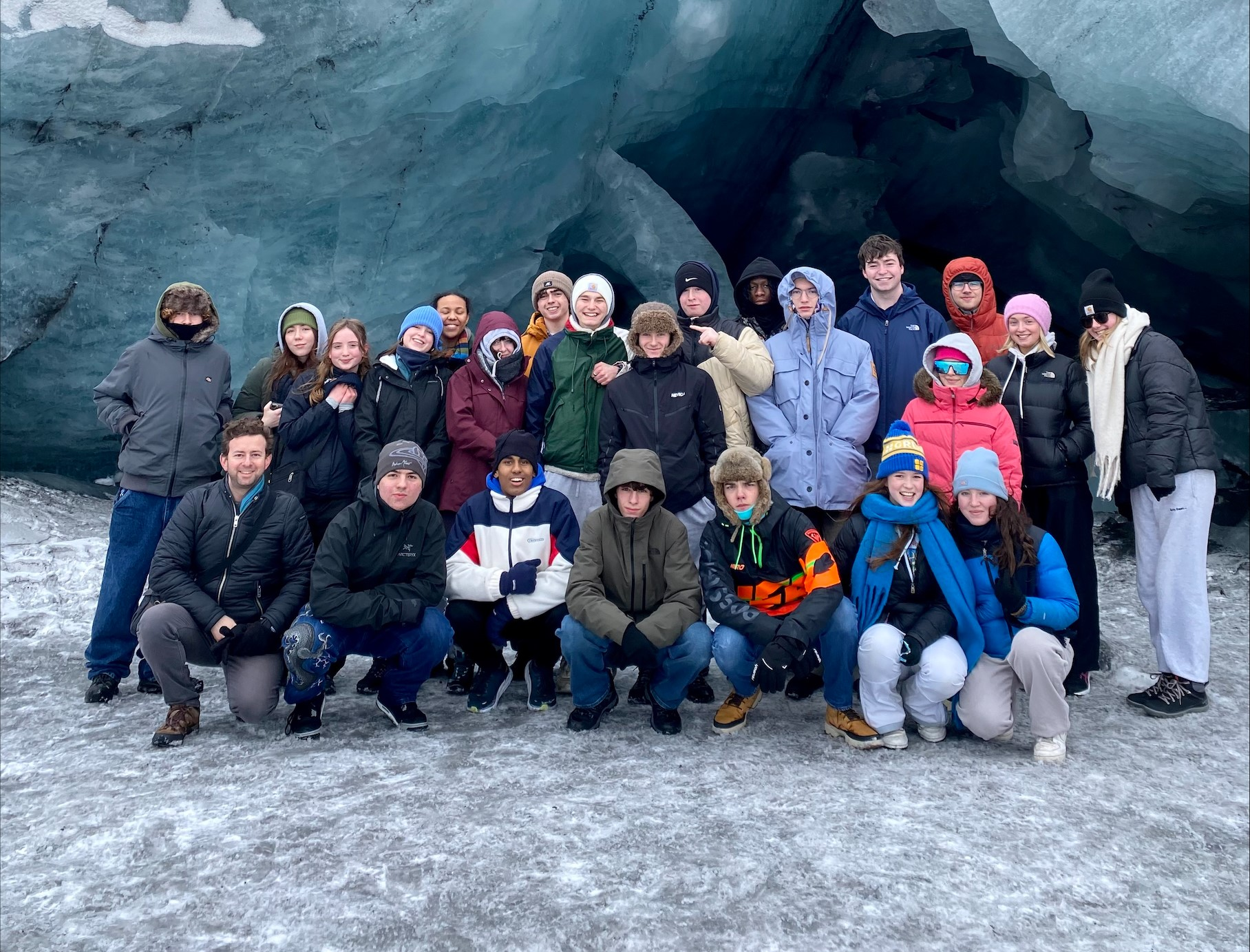Geography
Geography at Cardinal Vaughan strives to foster in pupils a sense of awe in the physical and human world and the interconnections between them.
We believe that by encouraging and equipping all pupils to explore and make sense of an ever more complex and dynamic world, they then have the power to choose their own place within it and, in their own unique way, to change it for the better.
Pupils broaden their awareness of geographical locations, the natural and human formation of places and landscapes, the interactions between society and environment, and how communities, economies and environments are inextricably woven. This is achieved through considering the local and global dimensions of a variety of issues.
Unique in its ability to fuse science and the humanities, geography provides pupils with the technical understanding as well as the socio-economic awareness of the causes and effects of pressing global issues. Geographical enquiry is central to this and encourages a scientific approach to questioning, investigation and analysis.
Fieldwork and the use of ICT are an intrinsic part of geography at Cardinal Vaughan. Fieldwork opportunities at KS3-KS5 enable pupils to apply the skills they are taught in thinking spatially and in using maps, images and new technologies, including geographical information systems (GIS), to collect, present and analyse information. In so doing, pupils develop a broad range of transferable skills in computing, maths and literacy.
The Geography Department boasts excellent public examination results with a significant proportion of pupils deciding to pursue the subject to degree level and beyond. Geography, a traditionally respected academic discipline, is highly regarded by admissions tutors in Oxbridge and in all leading universities. The subject is also highly regarded by a diverse range of employers who welcome the breadth of perspective, problem-solving and other wide skills which the subject imparts.

A-Level Geography Trip to Iceland.
Curriculum Overview
Key Stage 3
The programme of study for KS3 Geography is based on the requirements of the National Curriculum, and a range of up-to-date and topical resources are used. Pupils are taught fundamental geographical skills, techniques and vocabulary. These skills are applied by studying a range of topics spanning the physical, human and environmental branches of the discipline. In the first form, pupils cover Map Skills, Weather and Climate, Russia, Rivers and Coasts topics. In the Second Form, pupils study Development, Tectonics, Population Change, Climate Change, Asia and the Middle East.
A fieldwork trip to Kew Gardens in First form allows pupils to investigate microclimates to put their learning into practice beyond the classroom. In the Second Form, pupils conduct an infiltration fieldwork investigation to understand the pressures of urbanisation and how cities can cope with more extreme weather associated with climate change.
GCSE Geography
Our GCSE follows the Edexcel GCSE Geography B syllabus. It consists of three papers, which will be externally assessed at the end of Fifth Form.
There is no coursework or controlled assessment.
Component 1: Global Geographical Issues
Written examination: 1 hour and 30 minutes
37.5% of the qualification
94 marks
Content overview:
- Topic 1: Hazardous Earth
- Topic 2: Development dynamics
- Topic 3: Challenges of an urbanising world
Component 2: UK Geographical Issues
Written examination: 1 hour and 30 minutes
37.5% of the qualification
94 marks
Content overview:
- Topic 4: The UK’s evolving physical landscape – including sub-topics 4A: Coastal change and conflict, and 4B: River processes and pressures.
- Topic 5: The UK’s evolving human landscape – including a Case Study - Dynamic UK cities.
- Topic 6: Geographical investigations – including one physical fieldwork investigation and one human fieldwork investigation linked to Topics 4 and 5.
Component 3: People and Environment Issues – Making Geographical Decisions
Written examination: 1 hour and 30 minutes
25% of the qualification
64 marks
Content overview:
- Topic 7: People and the biosphere
- Topic 8: Forests under threat
- Topic 9: Consuming energy resources
A-Level Geography
The A Level course follows the Edexcel GCE Specification. This course includes several fieldtrips, including Nettlecombe Court FSC, Somerset, as well as visits within Kensington & Chelsea, and to the Olympic redevelopment in East London. There are also visits, careers advice and guest speakers organised in conjunction with the urban planning team from Kensington & Chelsea, the Royal Geographical Society, and external organisations.
Content and assessment overview
The Pearson Edexcel GCE in Geography consists of three externally examined papers and one coursework component.
Paper 1 (Paper code: 9GE0/01)
Written examination:
2 hours 15 minutes
30% of A-level qualification
105 marks
Content overview
Topic 1: Tectonic Processes and Hazards.
Topic 2B: Coastal Landscapes and Change.
Topic 5: The Water Cycle and Water Insecurity
Topic 6: The Carbon Cycle and Energy Security
The examination may include short open, open-ended and resource-linked questions. The examination includes 12-mark and 20-mark extended writing questions. Calculators may be used.
Paper 2 (Paper code: 9GE0/02)
Written examination: 2 hours 15 minutes
30% of the A-level qualification
105 marks
Content overview
Topics 3 and 7: Globalisation/Superpowers
Topic 4A: Regenerating Places
Topic 8B: Migration, Identity and Sovereignty
The examination may include short open, open-ended and resource-linked questions. The examination includes 12-mark and 20-mark extended writing questions. Calculators may be used.
Paper 3 (Paper code: 9GE0/03)
Written examination: 2 hours 15 minutes
20% of the A-level qualification
70 marks
Content overview
The specification contains three synoptic themes within the compulsory content areas:
- Players
- Attitudes and actions
- Futures and uncertainties
The synoptic investigation will be based on a geographical issue within a place-based context that links to the three synoptic themes and is rooted in two or more of the compulsory content areas.
Assessment overview
An externally-assessed written examination. A resource booklet will contain information about the geographical issue.
All questions in the examination draw synoptically on knowledge and understanding from compulsory content drawn from different parts of the course.
The examination may include short open, open-ended and resource-linked questions. The examination includes 8-mark, 18-mark and 24-mark extended writing questions. Calculators may be used
Coursework: Independent Investigation (9GE0/04)
Non-examined assessment
20% of the A-level qualification
70 marks
Content overview
- The student defines a question or issue for investigation, relating to the compulsory or optional content. The topic may relate to any aspect of geography contained within the specification.
- The student’s investigation will incorporate fieldwork data (collected individually or as part of a group) and their own research and/or secondary data.
- The fieldwork, which forms the focus and context of the individual investigation, may be either human, physical or integrated physical-human.
- The investigation report will evidence independent analysis and evaluation of data, presentation of data findings and extended writing.
- Students will be expected to show evidence that they have used both quantitative and qualitative data to support their independent investigation as appropriate to the particular environment and/or location.
Assessment overview
The investigation report is internally assessed and externally moderated.
The student will produce a written report of 3000–4000 words.
Staff List
Mrs Delacave – Head of Geography
Miss Davison – Geography Teacher, Second in Charge of Future Pathways
Mr Brett – Geography Teacher, Head of First Form
Mr Leigh – Geography Teacher, Extra-curricular PE Lead
Trips and Other Activities
- Bi-annual trip to Iceland, February Half Term 2025
- First Form trip to Kew Gardens, November 2025
- Lower Sixth residential field trip to Nettlecombe Court, Somerset, May 2025
- Fourth Form trip to Rushall Farm June 2025
- Lower Sixth and Fourth Form human fieldwork trips Kensington & Chelsea June 2025
- GeogSoc is a fortnightly club for lower school pupils run by Geography Ambassadors in the Lower Sixth. A range of topical issues are selected, accompanied by quizzes, debates and tasks to unpack Geography beyond the classroom.
Curriculum links



